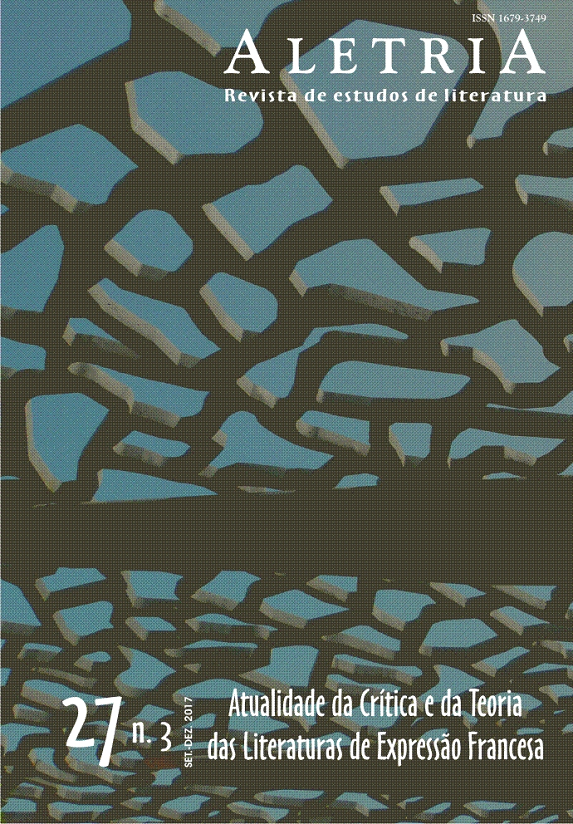Images of Hunting in Ovid’s Ars Amatoria
DOI:
https://doi.org/10.17851/2317-2096.27.3.237-256Keywords:
didactic poetry, hunting, narrative, myth, metaphor, OvidAbstract
In this article, we would like to focus on the incorporation of hunting topics into the Ars amatoria of Ovid. Although this work concentrates on the description of events and characters mainly inserted in an urban setting, due to its many contacts with the tradition of Roman love elegy, we certainly have the employment of many agricultural or hunting images inside the poem. Regarding the employment of hunting images in the Ars, we differentiate those times in which they are connected to mythical narratives from those in which such overlap does not occur. In the latter case, these images tend to be produced as metaphors, but not in the first one, what would bring the language of mythical excerpts of hunting from the Ars amatoria closer to the denotative employment of language.
Downloads
References
AYMARD, Jacques. Les chasses romaines: des origines à la fin du siècle des Antonins. Paris: E. de Boccard Éditeur, 1951.
AZEVEDO, Sarah Fernandes Lino. As ideias de ordem e desordem imperiais relacionadas às leis matrimoniais de Augusto: uma análise sob a ótica das relações de gênero. Mare Nostrum, São Paulo, v. 5, n. 5, p. 44-58, 2014.
CARCOPINO, Jérôme. La vie quotidienne à Rome dans l’apogée de l’Empire. Paris: Pluriel, 2011.
COELHO, Ana Lucia Santos. Sexualidade e poder: os ensinamentos amorosos de Ovídio em confronto com a ordem visual da Vrbs de Augusto. Métis: História & Cultura, Caxias do Sul, v. 13, n. 26, p. 77-99, jul./dez. 2014.
CHARPIN, François. Le féminin exclu: essai sur le désir des hommes et des femmes dans la littérature latine. Paris: Calepinus; Michel de Maule, 2001.
DAY, Archibald A. The Origins of Latin Love Elegy. Oxford: Basil Blackwell, 1938.
GIANGRANDE, Giuseppe. Topoi ellenistici nell’Ars amatoria. In: GALLO, Italo; NICASTRI, Luciano (Org.). Cultura poesia ideologia nell’opera di Ovidio. Napoli: Edizioni Scientifiche Italiane, 1991. p. 61-98.
GRATTIUS. Cynegetica. In: PUBLILIUS SYRUS et alii. Minor Latin Poets. Tradução de J. Wight Duff and Arnold M. Duff. Cambridge, Mass.; London: England, 1982. v. 1, p. 143-208.
GREEN, C. M. C. Terms of Venery: “Ars Amatoria” I. Transactions of the American Philological Association, Baltimore, v. 126, p. 221-263, 1996. doi: https://doi.org/10.2307/370178
GRIMAL, Pierre. Dictionnaire de la mythologie grecque et romaine. Paris: Presses Universitaires de France, 1963.
HOLZBERG, Niklas. Ovid: the poet and his work. Tradução de G. M. Goshgarian. Ithaca: Cornell University Press, 2002.
HUNTER, R. L. A Comédia Nova da Grécia e de Roma. Tradução de Rodrigo Tadeu Gonçalves et al. Curitiba: UFPR, 2010.
LABATE, Mario. L’arte di farsi amare: modelli culturali e progetto didascalico nell’elegia ovidiana. Pisa: Giardini, 1984.
LEACH, Eleanor Winsor. Georgic Imagery in the “Ars amatoria”. Transactions and Proceedings of the American Philological Association, Baltimore, v. 95, p. 142-154, 1964.
MOCANU, Alin. Hunting in Seneca’s “Phaedra”. Past Imperfect, Alberta, v. 18, p. 27-52, 2012.
OVÍDIO. Arte de amar. Tradução, introdução e notas de Matheus Trevizam. Campinas: Mercado de Letras, 2016.
OVÍDIO. Primeiro livro dos “Amores”. Tradução de L. A. de Bem. São Paulo: Hedra, 2010.
PROPÉRCIO. Elegias de Sexto Propércio. Tradução, organização, introdução e notas de G. Gontijo Flores. Belo Horizonte: Autêntica, 2014.
TOOHEY, Peter. Epic lessons: an introduction to ancient didactic poetry. London; New York: Routledge, 1996.
VEYNE, Paul. A elegia erótica romana. Tradução de Mariana Echalar. São Paulo: UNESP, 2015.
WHITLATCH, Lisa A. The Hunt for Knowledge: Hunting in Latin Didactic Poets. 2013. 183 f. Thesis (Doctorate in Philosophy) – Graduate School-New Brunswick, New Brunswick, New Jersey, 2013.
Downloads
Additional Files
Published
How to Cite
Issue
Section
License
Copyright (c) 2017 Matheus Trevizam (Autor)

This work is licensed under a Creative Commons Attribution 4.0 International License.
Authors who publish with this journal agree to the following terms:Authors retain copyright and grant the journal right of first publication with the work simultaneously licensed under a Creative Commons Attribution Non-Commercial No Derivatives License that allows others to share the work with an acknowledgement of the work's authorship and initial publication in this journal.Authors are able to enter into separate, additional contractual arrangements for the non-exclusive distribution of the journal's published version of the work (e.g., post it to an institutional repository or publish it in a book), with an acknowledgement of its initial publication in this journal.Authors are permitted and encouraged to post their work online (e.g., in institutional repositories or on their website) prior to and during the submission process, as it can lead to productive exchanges, as well as earlier and greater citation of published work (See The Effect of Open Access).





